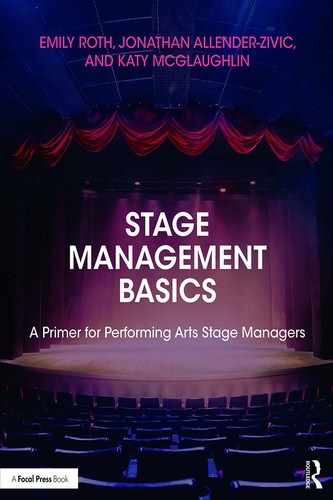Chapter Four
Safety
Safety is the most important factor in any production. As such, it should be the top priority for the stage manager to know all safety procedures for the space, and the location of all first aid kits, fire extinguishers, emergency exits, and AED equipment (if applicable). It is also important to know the emergency protocol and safety locations of the venue. Remember, in this day and age, all decisions will eventually have to stand up to scrutiny and possible legal repercussions after the event is all said and done.
First Aid Kits
Note where all first aid kits are located; find out who is responsible for their upkeep and supply level (it might be the stage manager) and be sure they stay up to date in case of an emergency.
It is important to note any and all injuries that warrant first aid on the rehearsal or performance report—use your best judgment (e.g., a paper cut doesn’t need to be noted).
Weaponry
Any shows requiring weaponry will require their own set of safety steps. All weapons will need to be locked away in a secure area whenever they are not in use. Typically, they are given their own box, crate, or carrying case that can be locked. Keys are given only to the stage manager and sometimes the fight choreographer/fight captain. Any real weapons must be made actor safe (dulled blades). Anyone using functioning firearms must be given safety training and follow proper protocol in regards to the loading, unloading, and handling of these. All safety steps in regards to weaponry must be taken very seriously and enforced among the company.
Emergency Procedures
In the event of an emergency, it is important to stay calm. The stage manager is setting an example for all others to follow and if they are in a panic, others will panic too. Stage managers must use their best judgment in the event of an emergency, but always err on the side of caution. The first meeting with the theater staffis a great time to ask about the company’s emergency procedures.
- Is there a designated tornado shelter area? Is it the theater? If so, what does that mean during a performance?
- Will you or the house manager be responsible for the audience in the case of an evacuation?
- If you are responsible, arrange to get a house count for each performance as soon as one is available.
- Is there a policy in place for power outages?
- How long do you hold the show?
- What is the “rain check” ticketing policy?
- Is there emergency power?
- If you are working in an outdoor theater, do you hold at the first sign of rain or push through until you see lightning or the stage becomes unsafe?
- If you have to hold, how long do you wait before canceling the rest of the performance?
- What is the procedure if a company member becomes ill during a performance?
- Is there a procedure in place for an armed gunman on the premises or bomb threats?
- Is there a security force associated with the theater or performance space? (This may become clear without asking—if there is security, these are good people to know.)
Some good general practices are outlined below, but remember to always use your judgment, as each situation will be unique.
Medical Emergency
Contact 9-1-1 if you feel emergency personnel are warranted. In conjunction with the house manager, attempt to quietly and calmly remove the person in question to the lobby without disturbing the production to allow emergency personnel easy access and keep the audience calm. If necessary, make an announcement to hold the show and inform the audience calmly what is taking place and that the show will continue when possible. If working in an academic setting, contact Campus Security to inform them of the situation as well; depending on the campus there may be varying protocols for contacting security. If working in an arts center environment, contact Building Security if applicable. While many companies and theaters request that local security (academic, building) be contacted first, this can delay the response time of emergency personnel, so it is best to make a judgment call in these situations that will best serve the person having the emergency.
Security Emergency
Contact 9-1-1 (or, if applicable, Campus or Building Security) if you feel emergency personnel are warranted. If needed, calmly direct patrons to the safest location for the situation.
Weather
Remain calm, use the house address system (if applicable) to inform patrons of the issue, and follow the procedure discussed in the first meeting with the theater staff. In the case of weather events (tornados, flooding, etc.), find out the safest place for patrons.
Suspicious Persons
If possible lock the theater doors to keep the person or persons out. Wait for emergency personnel for additional instructions.
Fire
Contact 9-1-1, make an announcement to the audience, and direct them to quickly and calmly move to the nearest emergency exit. To the best of your ability try to account for all of the people in the theater (cast, crew, audience) once it has been evacuated.
If considering pursuing stage management as a career or a lifelong hobby, take a course in first aid and get CPR, AED, and Bloodborne Pathogen Certified. This is often required of professional stage managers and will serve you extremely well when faced with the inevitable injuries that occur backstage, onstage, or in the rehearsal space.
Injury Report
If ever a member of the team is injured during rehearsals, workdays, or performances, an injury report should be filled out (or at least be available and offered). This documents the name of the injured, the date, the circumstances and severity of the injury, and any necessary follow-up (ambulance called, doctor’s visit required, etc.).
